Welcome to our comprehensive guide featuring the top 52 hotel websites, handpicked by our expert team of web designers and developers.
We’ve meticulously analyzed hundreds of hotel websites, ranking them based on crucial factors such as design, functionality, uniqueness, user experience, and other essential grading elements. Our goal is to provide hotels with a treasure trove of inspiration and ideas for their next website, ensuring an online presence that will captivate visitors and drive bookings.
In this article, we’ll delve into the essential components of a successful hotel website, including seamless navigation, enticing visuals, detailed room information, and an intuitive booking process that keeps visitors engaged and eager to plan their stay. This isn’t our first similar article – if you head over to our best websites article you’ll find a collection of thousands of beautiful websites organized into dozens of different business industries.
So, buckle up and join us as we explore the world of exceptional hotel web design, and learn how to create an online experience that leaves a lasting impression.
Top Hotel Website Designs
1. The Osthoff Resort
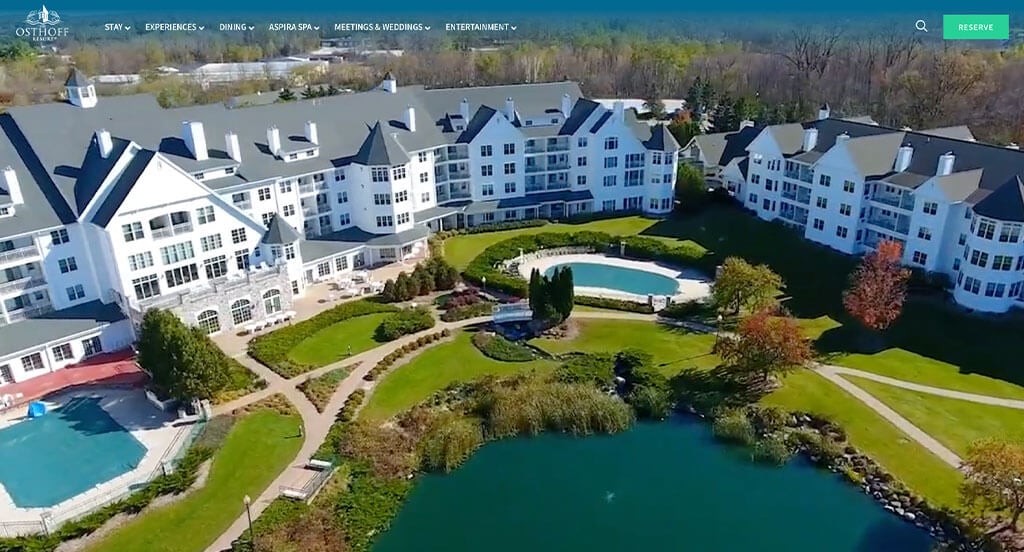
This is a good example of a website design for hotel owners who are looking for a professional website layout. The stunning imagery was probably the most impactful quality in the homepage of The Osthoff Resort. The creative logo was another design quality in this professional hotel website we enjoyed. They had website usability in mind when creating the clearly labeled menu for their website. With so many quality reasons to consider this hotel website, it’s obvious why we included it in this list of the best sites!
2. Great Wolf Lodge

This is a great web design example for hotel owners looking for a professional website. The automatically playing video was probably the most impactful feature in the homepage of Great Wolf Lodge. Their offers that can be seen once the viewer chooses a location was definitely refreshing for a professional website. They clearly had website accessibility in mind when creating the layout for their site that was simple to navigate. For hotel owners looking for ideas on their next website, this example will definitely be one to take a look at.
3. Hotel Goodwin

This is a creative website design example for a hotel owner who is looking to build their next professional website. The most refreshing part of this hotel website was the layout that seems authentic to their company. The marble texture used throughout the site was another reason why we included this website in our list of the best websites for hotels. Hotel Goodwin clearly had ease of use in mind when creating the use of buttons throughout their website. There was no shortage of reasons to include this website in our list of websites for hotels to consider when designing their next website.
4. Hyatt
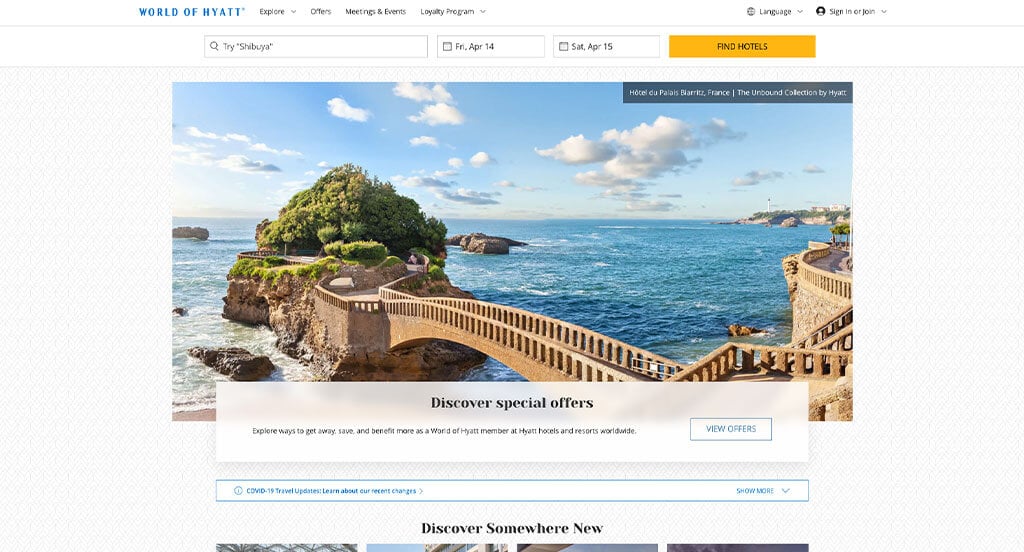
This is a great website design idea for a hotel owner looking for custom website layouts. The search bar to find hotels with your needs was probably the most impactful quality in the homepage of Hyatt. Another feature in this custom hotel site was their use of icons to help inform viewers. They clearly had a focus on website marketing when creating the geometric patterns for the background of their website. Any web designer developing websites for hotels will want to consider checking this website out.
5. Sybaris Pool Suites
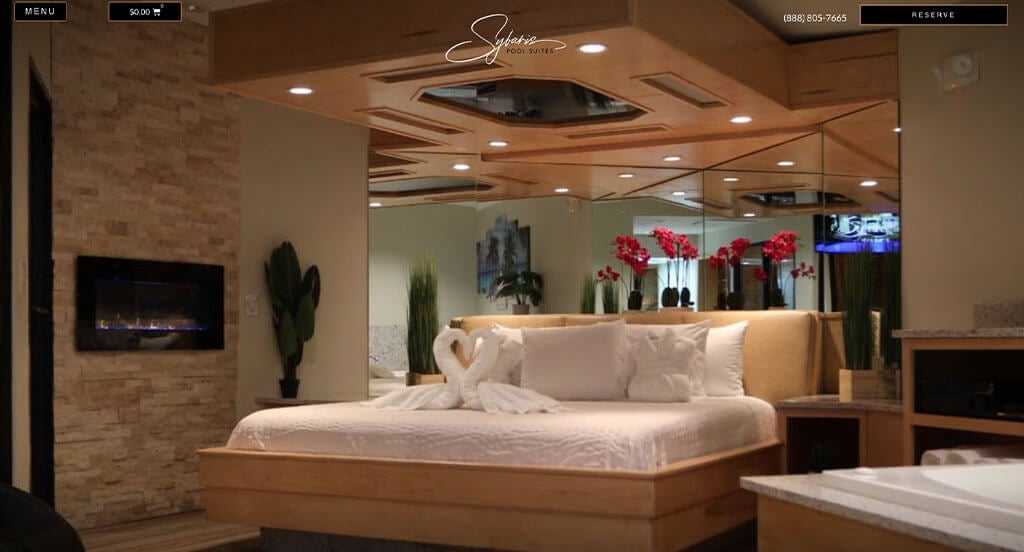
We immediately noticed the white, black and gold color scheme used in the Sybaris Pool Suites website, which we liked because it creates a luxurious design. After scrolling past the navigation of this hotel website, you’ll notice their captivating fonts. The large imagery was a good choice for a professional website. They clearly had digital marketing in mind when designing the easily accessible phone number for their company. What a great website to review when designing your next website!
6. Hilton

We immediately noticed the black, white and blue color scheme used in the Hilton website, which we liked because it creates a comforting and professional design. Of all the hotel websites we reviewed, one of the features in this custom website we liked was their use of images as buttons to enhance usability. The bold, blue text for titles was another design quality in this professional hotel website we enjoyed. Hilton clearly had a focus on internet marketing when creating the well-labeled navigation bar for their website. Give some thought to the unique design of this hotel website when building out your next website.
7. Kinn Guesthouse
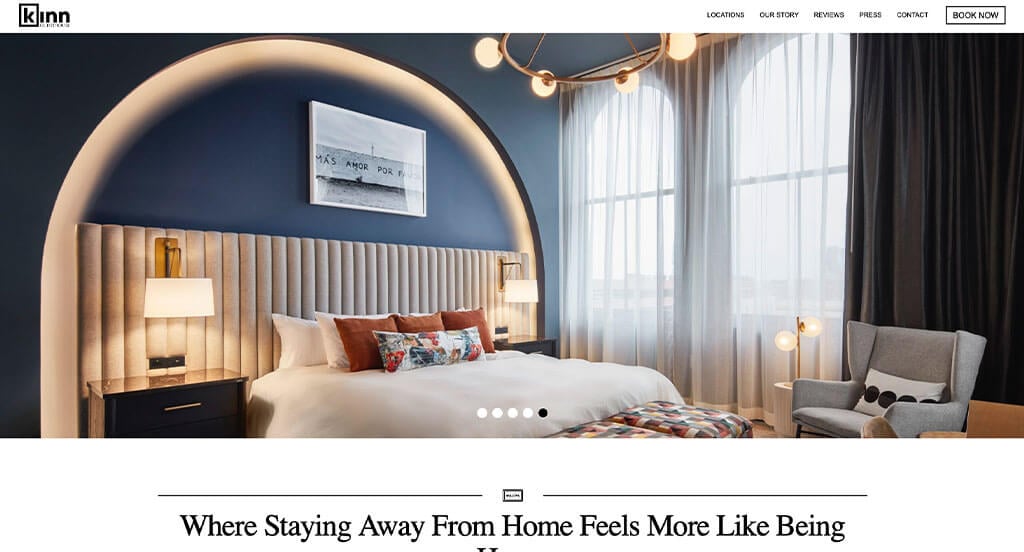
We liked how this hotel website combined the colors of black and white to create a striking layout for their custom website. After scrolling past the navigation of this hotel site, you’ll notice their unique photo frames. The use of buttons was refreshing for a custom hotel website. They clearly had a focus on website marketing when creating the delicate lines to organize their website. Be sure to consider the one-of-a-kind design of this hotel website when developing your next custom website.
8. The Ridge
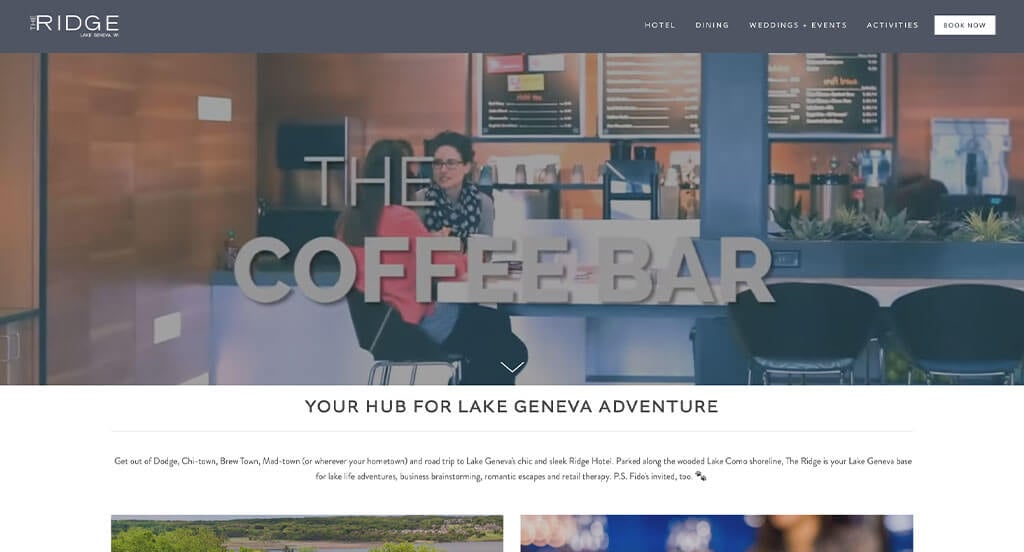
This is a creative website design example for a hotel owner looking to build their next custom website. The simple template was likely the most impactful feature in the homepage of The Ridge. Another feature in this professional hotel website we liked was their relaxing color scheme. They clearly had internet marketing in mind when creating the well-labeled navigation bar for their website. For hotels looking for examples for their next website layout, this example will for sure be one to consider.
9. Drury Hotels
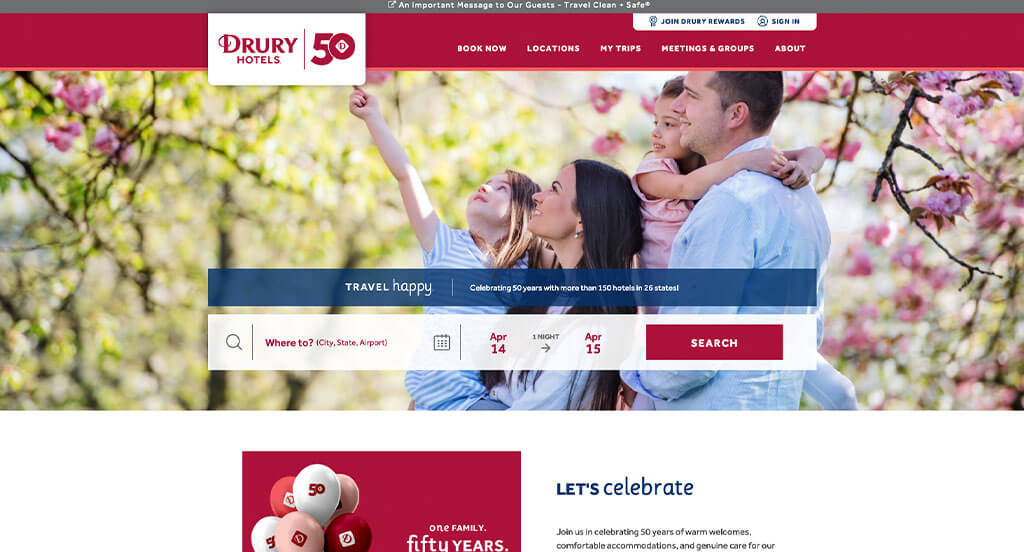
This is a great hotel web design example for someone who is looking to develop a professional website. We thought this was a good homepage design example for hotels because of their use of icons. This clean hotel website also does a good job with their professional font. They had website accessibility in mind when designing the domain for their website that matches their company’s name. Any web designer developing websites for hotels will want to consider checking this website out.
10. Delafield Hotel
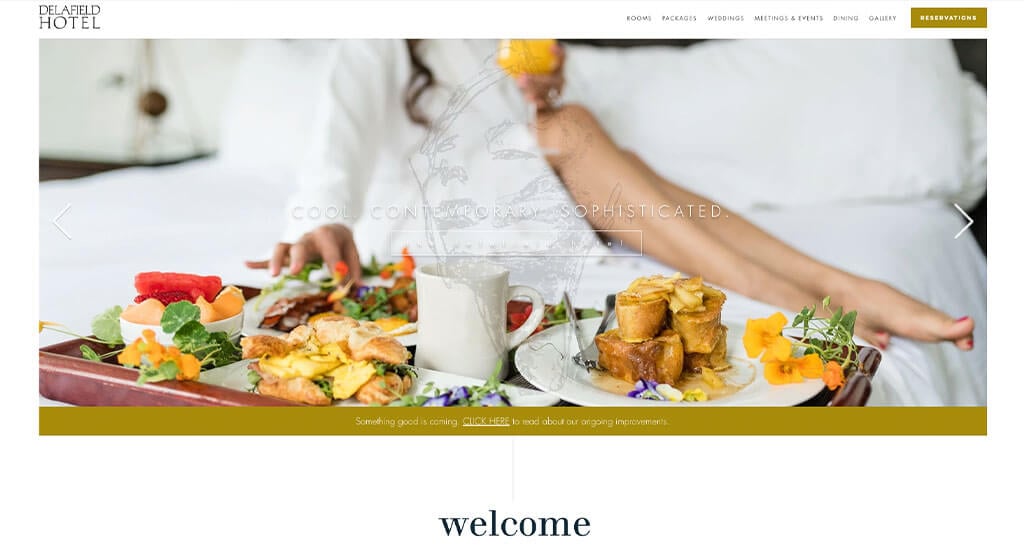
The Delafield Hotel website has a very professional feel to it, thanks to its unique use of black, white and gold. After scrolling past the navigation of this hotel site, you’ll immediately notice their layout that is aesthetically pleasing. This creative hotel website also does a good job with the inclusion of a blog. They clearly had ease of use in mind when creating the clearly labeled menu for their website. Don’t forget to check this website out while looking through our list of the best hotel website layouts!
11. IronWorks Hotel

This is a good example of a website design for hotels looking for a professional website. We thought this was a good example of a homepage layout for hotels because of their automatically playing video. Their large font for titles was definitely refreshing for a unique site. Their stunning imagery helped make this one of the top hotel websites we considered. If you are looking for template examples for your next hotel site, be sure to check this one out.
12. The Champagne Lodge & Luxury Suites
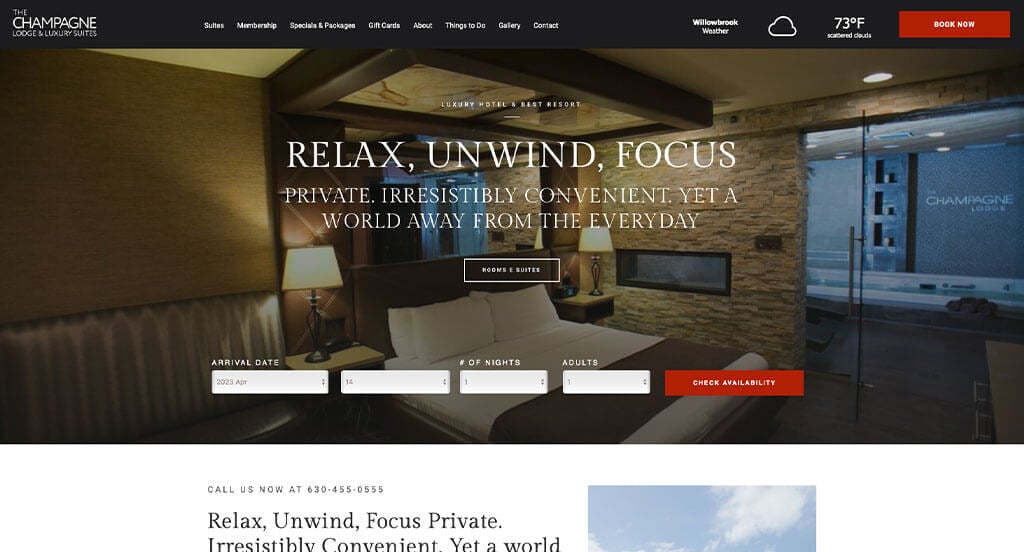
We chose The Champagne Lodge & Luxury Suites because of its nicely organized hotel website that uses a black, white and red color scheme, which we like because it creates a luxurious design. After scrolling past the header of this hotel site, you’ll immediately notice the professional text. Another design quality in this creative hotel site was the short and to the point paragraphs. They clearly had internet marketing in mind when designing the inclusion of a photo gallery for their website. With so many great reasons to consider this hotel website, it’s no wonder we included it in this list of the best websites!
13. Stoney Creek Hotels

This is a good example of a web design for hotels looking for a custom layout. As you scroll through the homepage of this website, one of the qualities you’ll notice right away is their automatically playing video. The relaxing color palette was refreshing for a custom hotel site. Stoney Creek Hotels had digital marketing in mind when building the domain for their website that matches their company’s name. Don’t skip past this website when considering design ideas for your next hotel website!
14. AmericInn by Wyndham
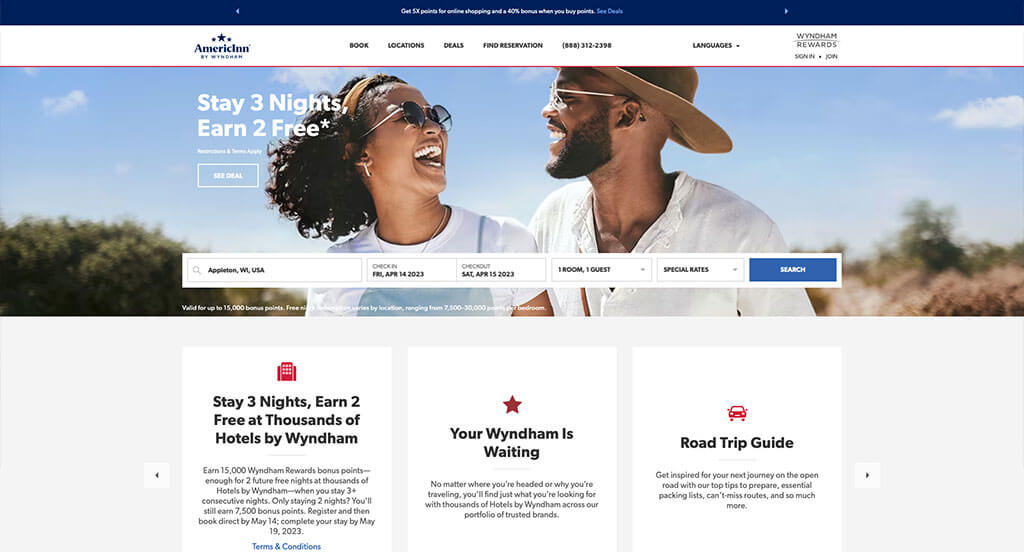
This is a good example of a website for a hotel owner looking for a custom look and feel for their next site. Our web designers thought this was a good example of a homepage for hotels because of their layout that was free of distractions. The page dedicated to their deals in this website helped it make it into our list of the best websites for hotels. Their buttons to enhance usability helped make this one of the top hotel websites we considered. Be sure to consider the unique design of this hotel website when developing your next website.
15. The Edgewater Hotel
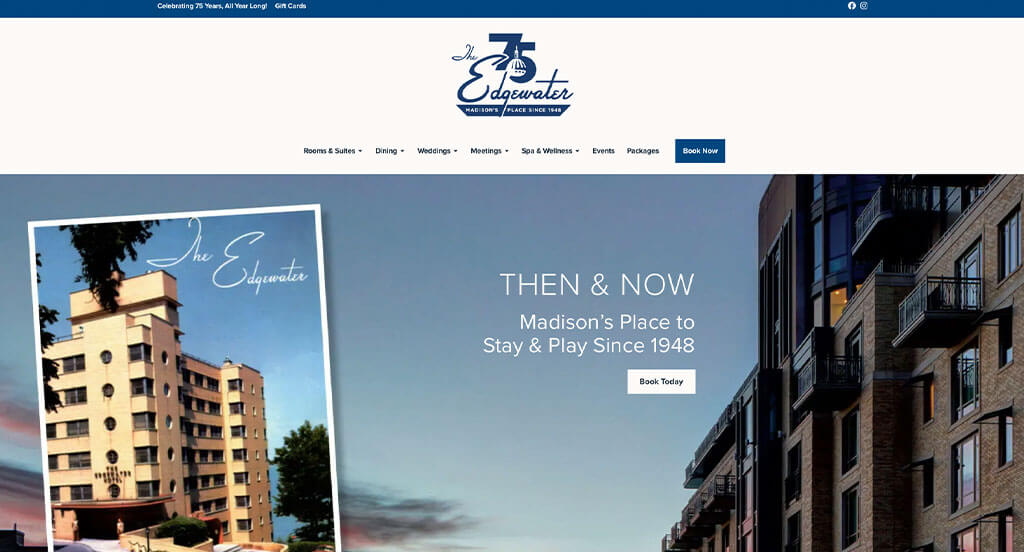
This is a good example of a website design for hotels who are looking for a professional website. While most hotel websites share this quality, we thought The Edgewater Hotel did a nice job choosing a color palette that matches their company. The high quality images were a nice touch for a professional site. The Edgewater Hotel clearly had website marketing in mind when building the featured package section for their website. What a great website to review when designing your next website!
16. Hotel Arista

This is a great web design example for hotels who are looking for a professional look and feel for their next site. One of the homepage features of Hotel Arista we noticed was their interesting logo design because it was rather refreshing for a hotel website. Their orange accent color was another design quality in this custom hotel website we enjoyed. Hotel Arista had digital marketing in mind when designing the domain for their website that matches the company’s name. Any website designer making websites for hotels will want to consider checking this website out.
17. Four Seasons
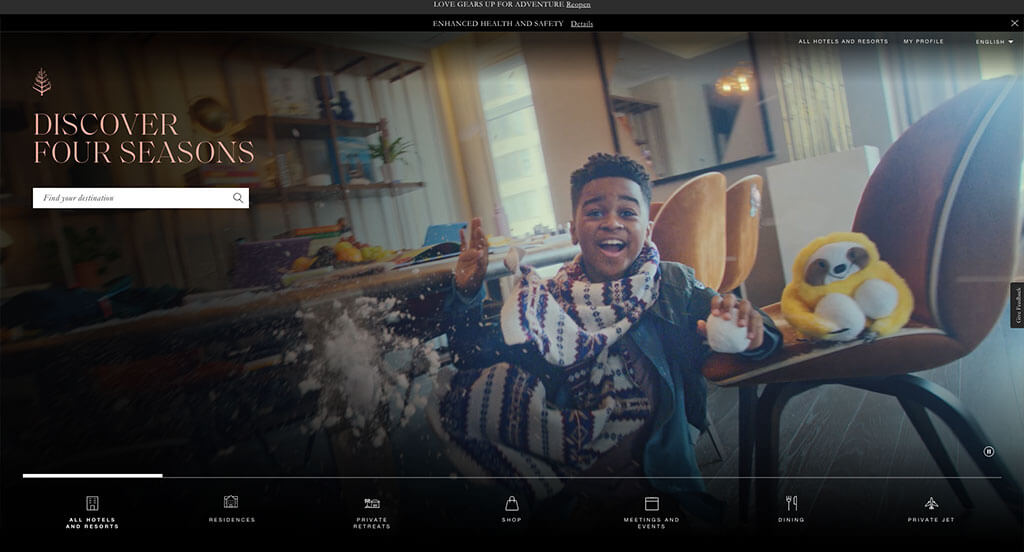
Four Seasons has a well-designed hotel website that uses a black and white color palette. Our web designers thought this website was a good design idea for hotels because of their inventive logo design. Their breathtaking visuals were another reason why we included this website in our list of the best website layouts for hotels. The incorporation of social media helped make this one of the best hotel websites we looked at. So many attractive qualities to consider when ranking this website.
18. Hotel Indigo
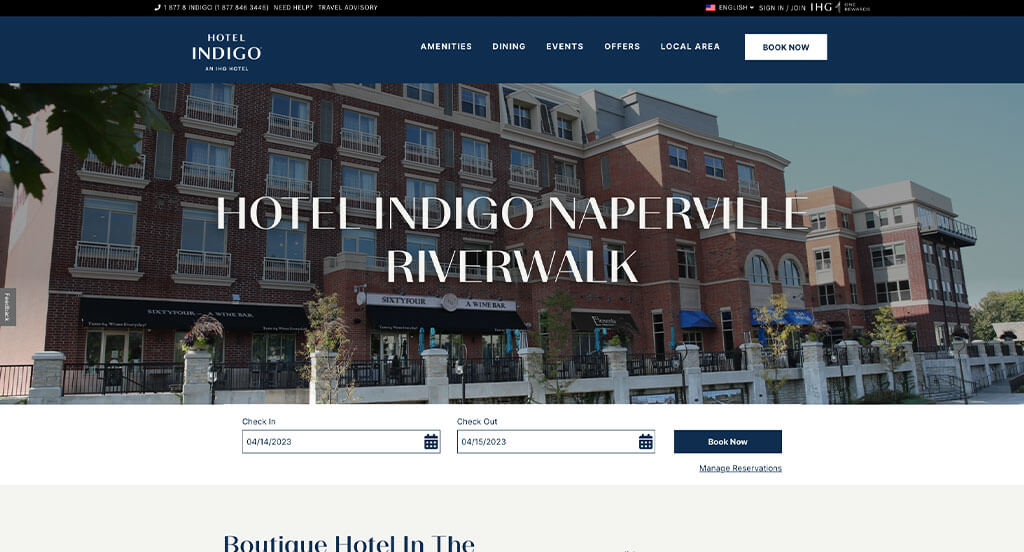
Showcasing a clean and intuitive layout, this website keeps things simple for a hotel site. One of the homepage features of Hotel Indigo we noticed was their use of graphics. The professional layout was a nice touch for a unique hotel website. Hotel Indigo clearly had website usability in mind when designing the FAQ page for their website. Give some thought to the unique design of this hotel website when developing your next website.
19. Marriot Bonvoy
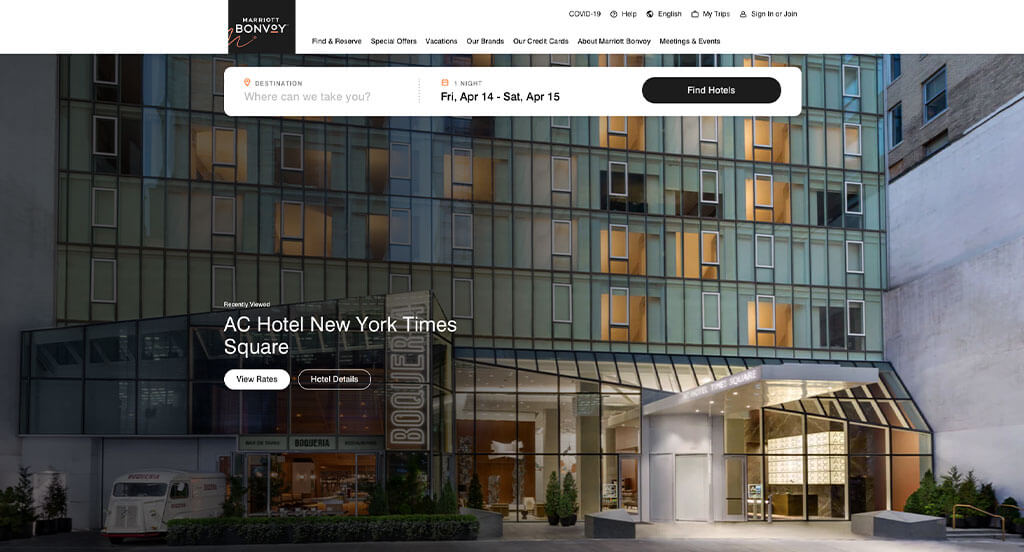
This is a great website design example for a hotel owner looking for inspiration on a custom look and feel for their next site. The large, captivating imagery was likely the most impactful feature in the homepage of Marriott Bonvoy. The search bar was another design quality in this custom hotel site we enjoyed. They had website usability in mind when building the deals section for their website. For hotels looking for examples for their next website layout, this design example will absolutely be one to take a look at.
20. Grand Traverse Resort

For a hotel website, they did a great job utilizing white, blue and gray colors throughout their site. After scrolling past the navigation of this hotel website, you’ll notice their stunning video that automatically plays. The creative logo design was definitely refreshing for a custom hotel website. Grand Traverse Resort had website usability in mind when building the domain for their website that matches their company’s name. If you are looking for template ideas for your next hotel site, be sure to check this one out.
21. The Atheneum
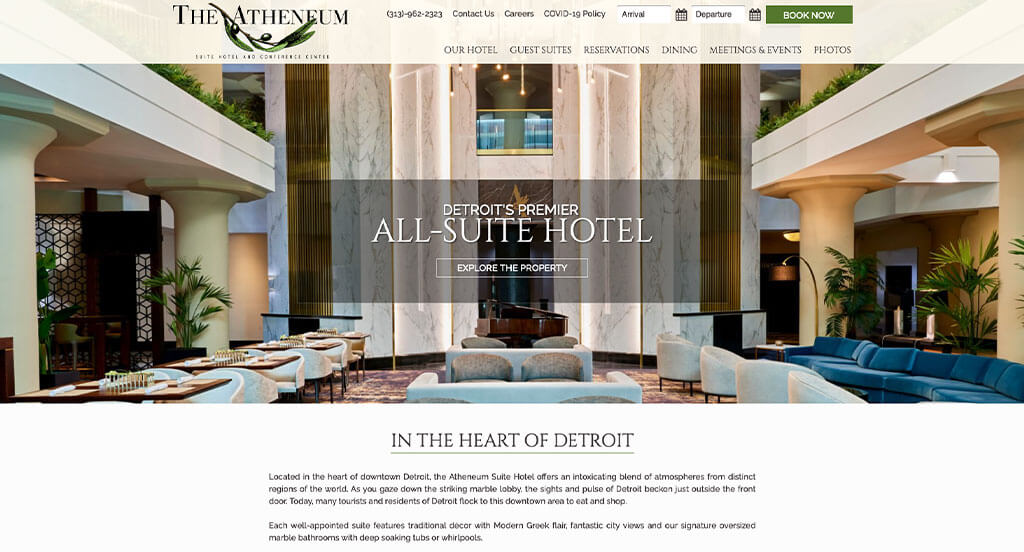
This is a good example of a hotel website design for a person who is looking for a professional look and feel for their next site. The most attention grabbing aspect of this hotel website was definitely their high-quality visuals. The delicate template was a nice addition to this professional hotel website. Their simple contact information helped make this one of the top hotel websites we looked at. Be sure to consider the creative design of this website when building your next hotel website.
22. Delamar
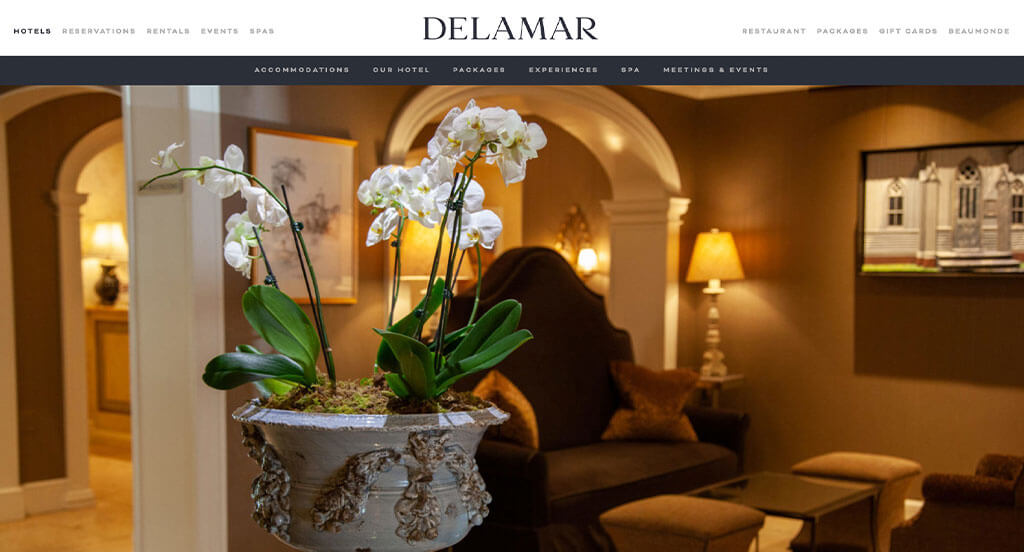
This is a good example of a hotel website design that can provide inspiration for a professional website. The professional fonts were definitely the most impactful quality in the homepage of this website. This clean hotel site also does a good job with their display of awards. Delamar clearly had conversions in mind when designing the simple navigation for their website. Don’t forget to check this website out while looking through our list of the best hotel website layouts!
23. Pine Mountain Resort
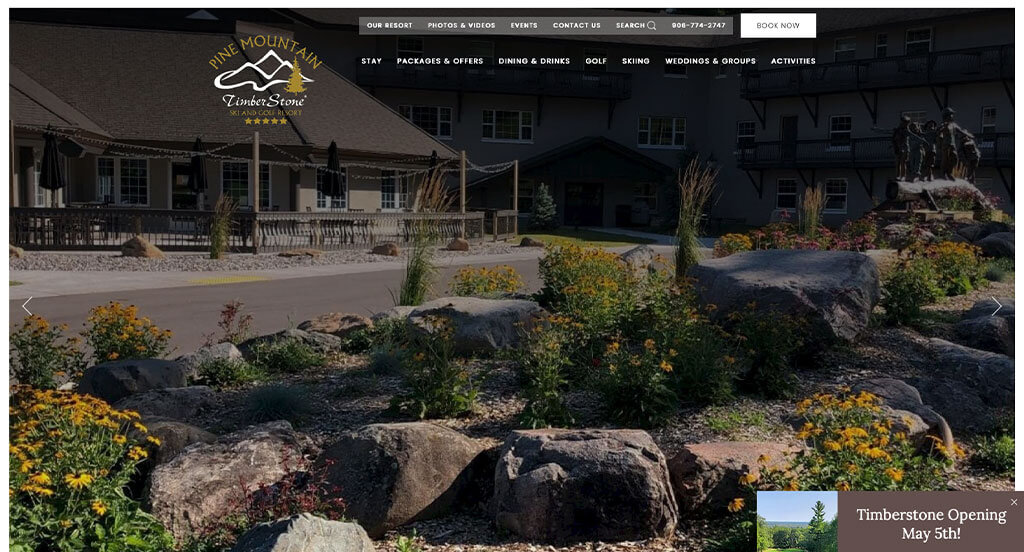
Showcasing a clean and intuitive layout, this site keeps things simple for a hotel website. After scrolling past the header of this hotel website, you’ll immediately notice their creative logo design. Their interesting patterns for their background was definitely refreshing for a professional hotel site. They had internet marketing in mind when creating the relaxing color scheme for their website. Any website designer mocking up websites for hotels will want to consider checking this website out.
24. Grand Hotel
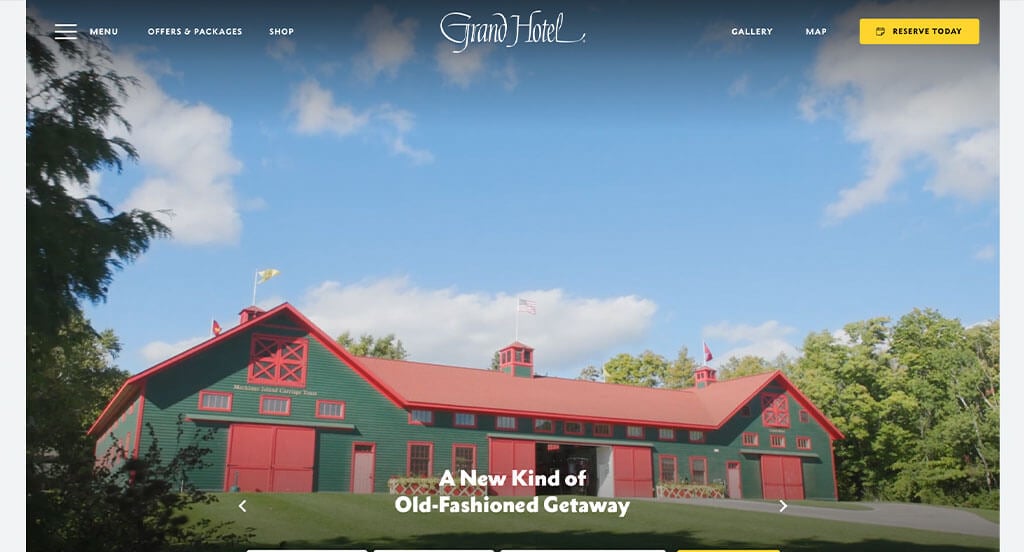
This is a good example of a website layout for a hotel owner looking for inspiration for their next custom web design. We thought this was a good example of a homepage layout for hotels because of their captivating visuals. Their professional font was definitely refreshing for a unique website. They clearly had website accessibility in mind when building the buttons to enhance usability throughout their website. You won’t be disappointed after reviewing this website for design ideas for your next website!
25. The American Club
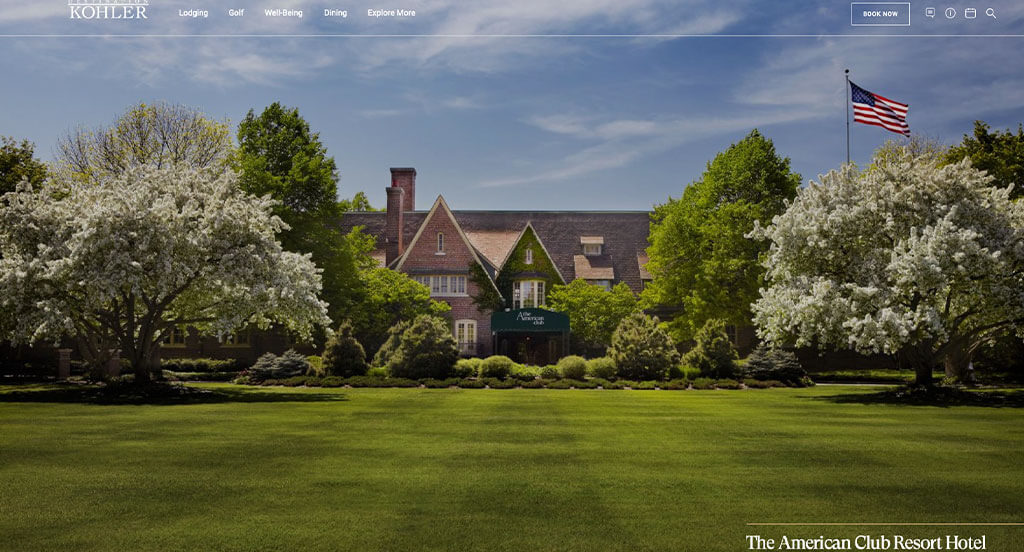
This is a great hotel web design example for anyone who is looking for a professional look and feel for their next site. The color palette that doesn’t take away from the site was likely the most impactful feature in the homepage of this website. The use of bullet points to organize information was definitely refreshing for a custom site. The well-labeled navigation bar helped make this one of the top hotel websites we looked at. So many attractive qualities to consider when ranking this website.
26. 3 one 3 Hotel
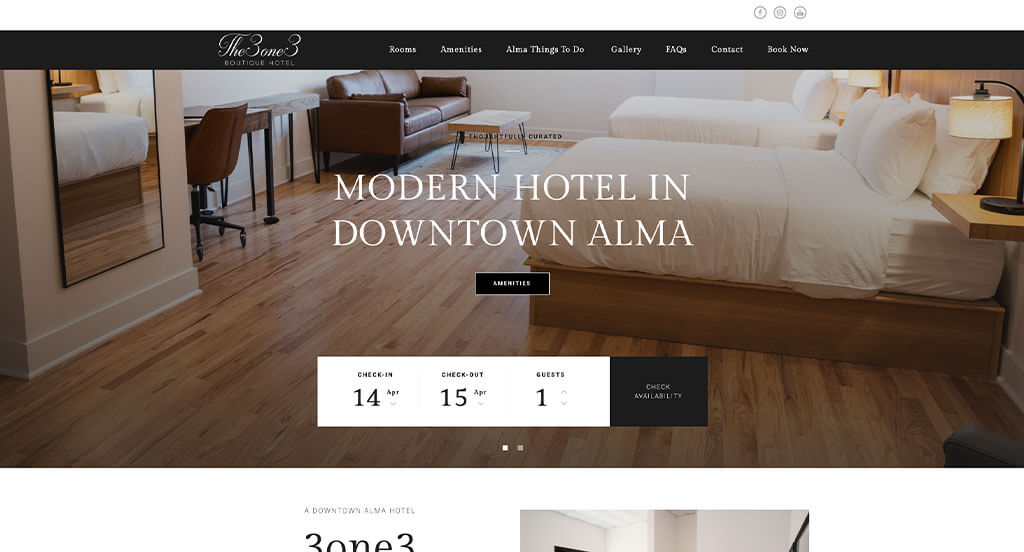
We liked how this hotel site combined the colors of black and white to create an attractive website design. One of the homepage features of 3 one 3 Hotel we noticed was their luxurious template because it was rather refreshing for a hotel website. Another thoughtful quality in this professional hotel site was the inclusion of a photo gallery. They had website usability in mind when designing the domain for their website that matches the company name. With so many good reasons to consider this hotel website, it’s no wonder we included it in this list of the best websites!
27. Shinola Hotel

This is a good example of a website design for hotels who are looking for a professional website layout. The most attention grabbing aspect in this hotel website was definitely their automatically playing video. This creative hotel website also does a good job with their easily accessible information. They had conversions in mind when designing the simple navigation throughout their website. Be sure to consider the one-of-a-kind design of this hotel website when developing your next website.
28. Bay Harbor

We chose Bay Harbor because of its nicely organized hotel website that uses black, white and blue for their color scheme. As you scroll through the homepage, one of the design qualities we liked was the template that was free of distractions. The inclusion of social media was definitely refreshing for a professional hotel website. They clearly had internet marketing in mind when creating the captivating imagery for their website. If you are looking for template ideas for your next hotel site, be sure to check this one out.
29. The Alexander
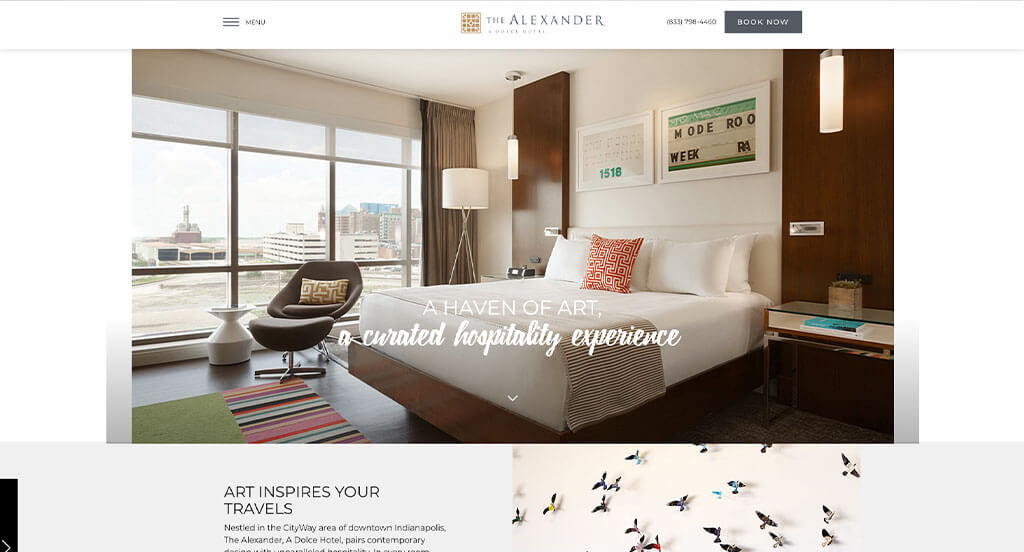
The white, gray and tan color scheme used in this hotel website stood out to us because it created a relaxing design. As you scroll through the homepage, one of the design qualities we liked was their captivating font. Another thoughtful feature in this creative hotel site was their short and to the point paragraphs. The Alexander clearly had digital marketing in mind when creating the clearly labeled menu for their website. These were just a few of the numerous qualities in this website we had to consider when putting together this list of top websites for hotels.
30. Bottle Works Hotel

This is a great website example for hotels who are looking for a custom look and feel for their next site. As you scroll through the homepage, one of the design qualities we liked was their balance of images and videos. Their red accent was one of the reasons we included this site in our rankings for the top web design ideas for hotels. Bottle Works Hotel clearly had conversions in mind when designing the buttons for simple navigation throughout their website. Give some thought to the one-of-a-kind design of this hotel website when developing your next custom website.
31. The Inn at Saint Mary’s
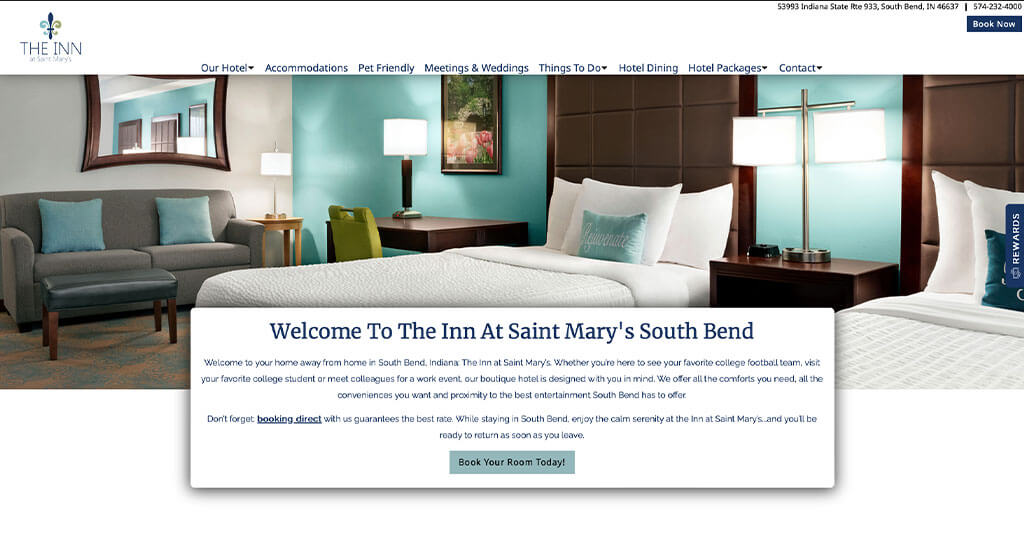
This is a great website example for hotels who are looking for a custom web design. As you scroll through the homepage of this website, one of the qualities you’ll notice right away is their short and to the point paragraphs. Another feature in this professional hotel site was their stunning imagery. The Inn at Saint Mary’s clearly had conversions in mind when creating the well-labeled navigation bar for their website. For the hotels out there checking website examples, make sure to check this one out!
32. The Bradley
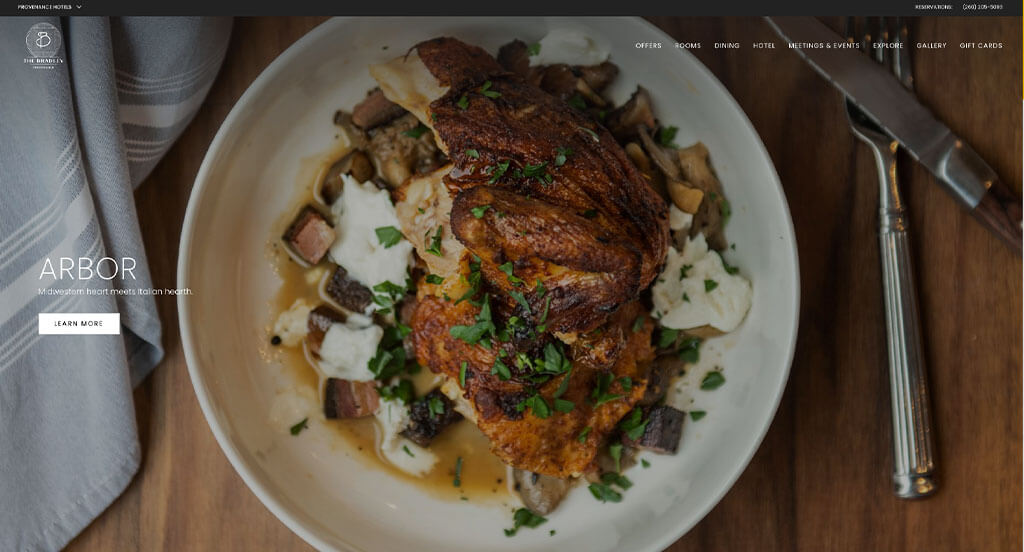
This is a great web design example for hotels looking who are looking for a professional layout. The layout that was very balanced was definitely the most impactful quality in the homepage of The Bradley. The impressive imagery was refreshing for a professional website. They had website usability in mind when creating the buttons for their website. Talk about a great website to have included in this list of top websites!
33. Landoll’s Mohican Castle
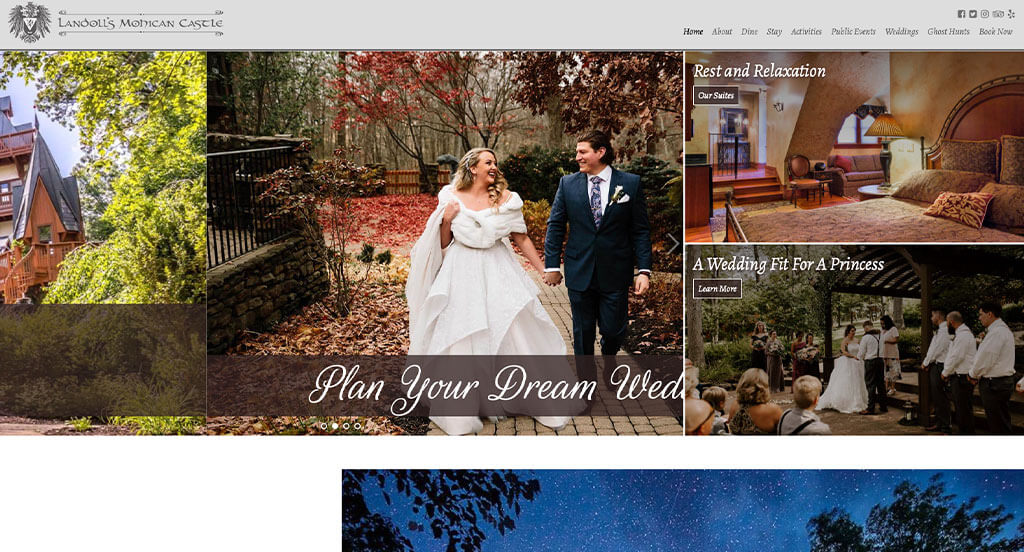
This is a good example of a hotel website design that can give inspiration to other companies for their professional website. The creative logo design was likely the most impactful feature in the homepage of this website. The feeling of unity throughout their images was another thoughtful feature in this custom hotel site we enjoyed. They had conversions in mind when building the professional font for their website. With so many good reasons to consider this hotel website, it’s obvious why we included it in this list of the best websites!
34. Ohio University Inn & Conference Center
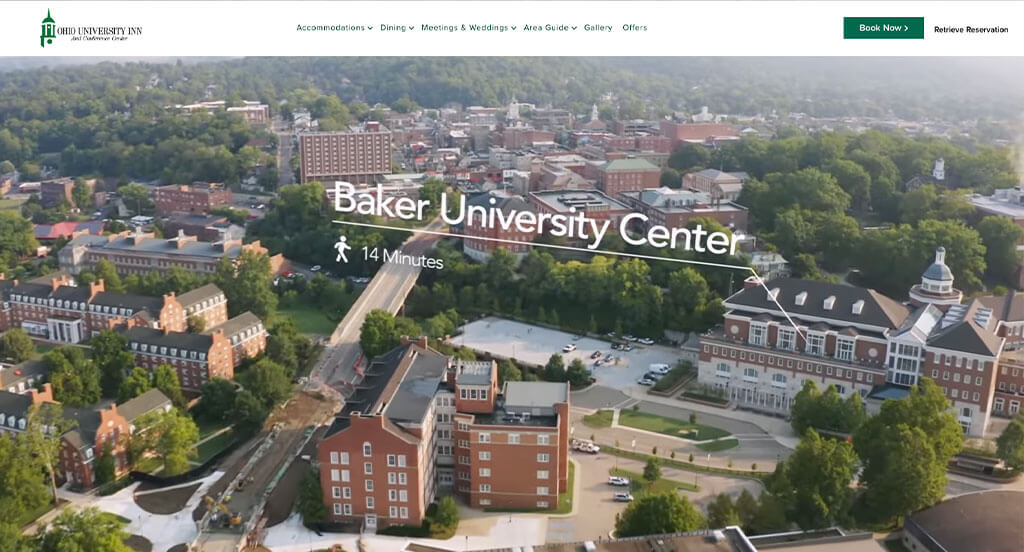
This is a great website design example for hotels who are looking for a custom website design. As you scroll through the homepage, one of the design qualities we liked was the use of creative patterns for their backgrounds. The inclusion of a photo gallery was another feature in this professional hotel website we enjoyed. Their simple logo design helped make this one of the best hotel websites we reviewed. Don’t scroll past this website when considering design ideas for your next hotel website!
35. Hancock Hotel
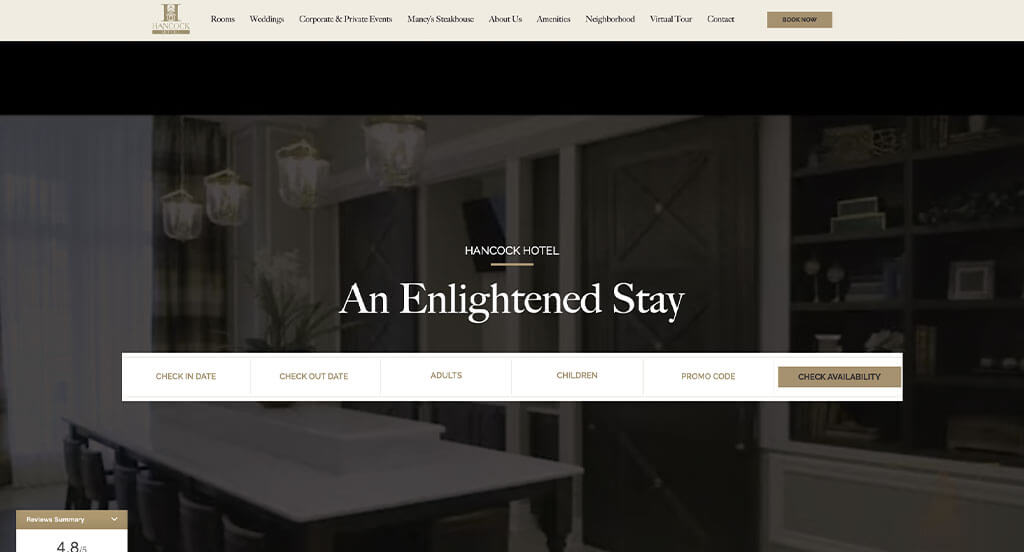
This is a good example of a hotel website design for a person who is looking for a professional look and feel for their next site. We thought this website was a good example for hotels because of their simplistic template. The stunning font choices were definitely refreshing for a custom hotel site. From a marketing perspective, we liked the way this hotel website utilized their well-labeled navigation bar. What a great website to review when designing your next hotel website!
36. Scarlet Oaks Retreat
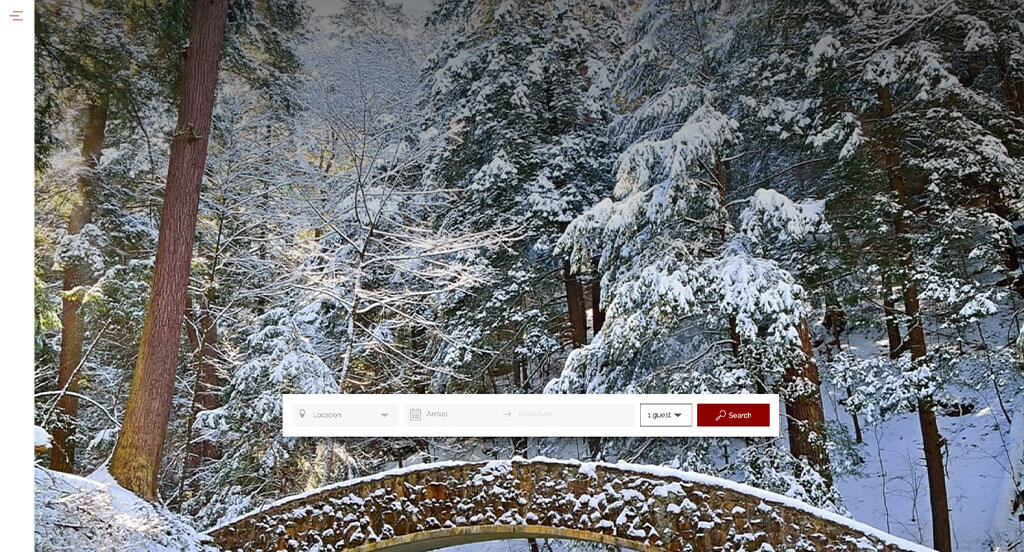
This is a great website example for hotels who are looking for a custom web design. The clearly labeled pricing was probably the most impactful quality in the homepage of this website. The clearly labeled menu was absolutely a consideration when ranking Scarlet Oak Retreats in this list of the best hotel websites. They clearly had ease of use in mind when designing the use of a type of search bar for their website. Be sure to consider the one-of-a-kind design of this hotel website when developing your next website.
37. Berlin Grande Hotel
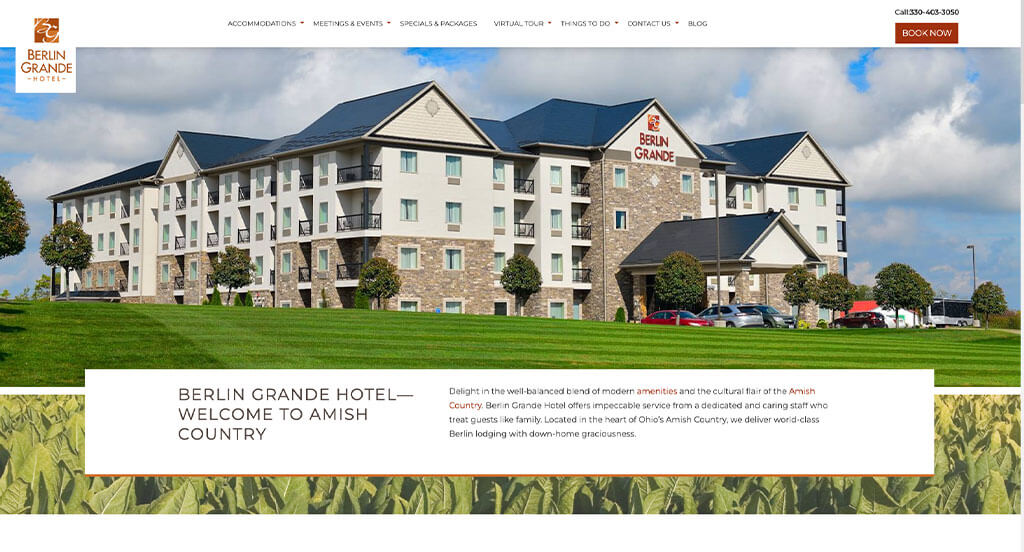
This is a great website design example for hotels to check out when looking for a custom look and feel for their next site. Our web designers thought this was a good example of a homepage layout for hotels because of the large imagery. The inclusion of a blog in this website helped it make it into our list of the best website ideas for hotels. Their buttons for simple navigation throughout their site helped make this one of the top hotel websites we looked at. For hotels who are looking for ideas on their next website, this example will definitely be one to keep in mind.
38. Dutchman Hospitality
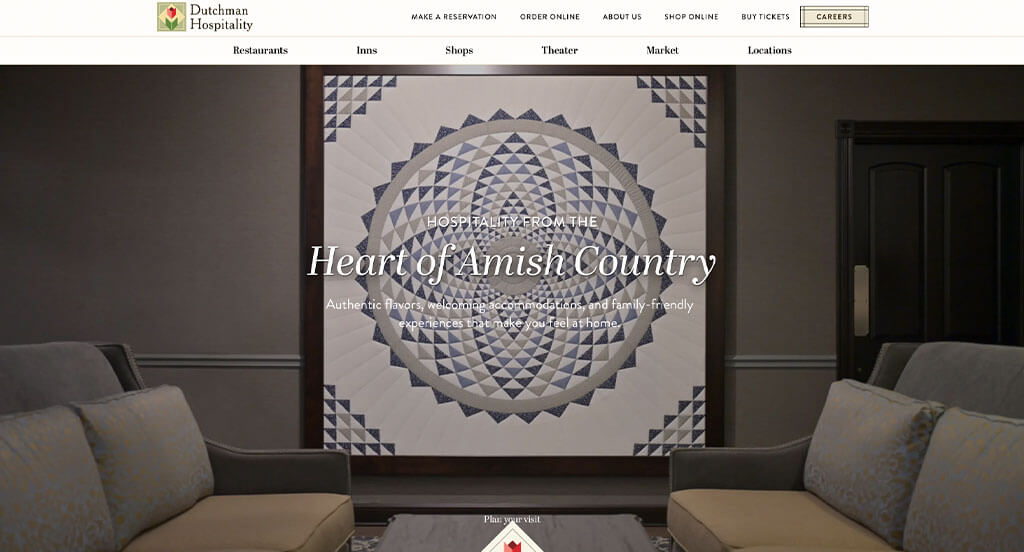
This is a good example of a website design for hotels who are looking for a custom site layout. One of the design features we liked most on the homepage of Dutchman Hospitality was their logo that clearly shows off their company because that isn’t something you find on most hotel websites. The subtle geometric patterns found throughout their site was another thoughtful feature in this professional hotel site we enjoyed. The well-labeled navigation bar was one of the marketing features that really stood out when reviewing this website. These were just a few of the numerous qualities in this website we had to consider when putting together this list of top websites for hotels.
39. Inn of Chagrin
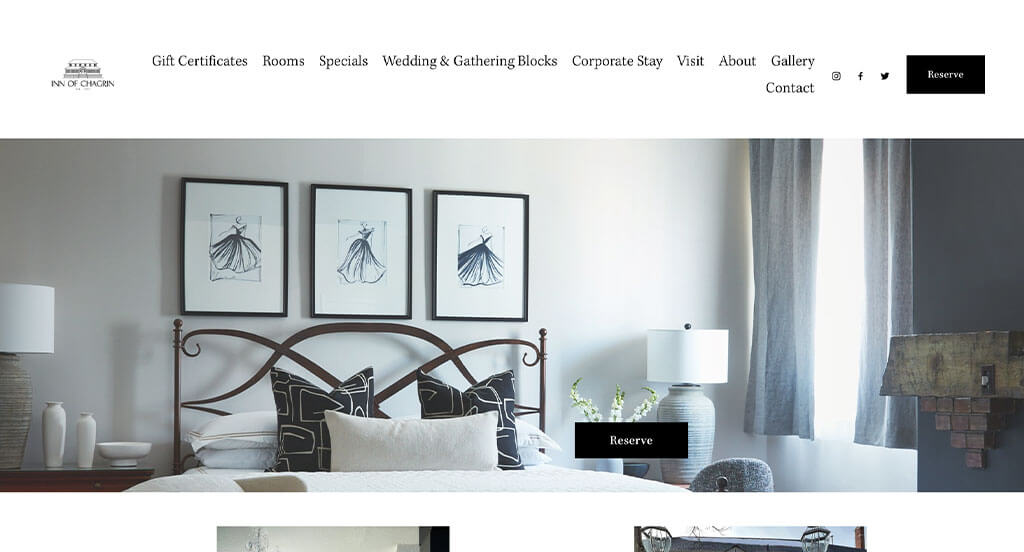
This is a good example of a website design for hotels who are looking for a professional layout for their next site. Our web designers thought this website was a good design idea for hotels because of their well planned imagery. The template that seems authentic to the site was a unique choice for a professional hotel website. From a marketing viewpoint, we liked the way they utilized a photo gallery. Give some thought to the one-of-a-kind design of this hotel website when developing your next website.
40. Nemacolin

The natural color scheme used in this hotel site stood out to us because it creates a relaxing feeling. The professional font choice was likely the most impactful quality in the homepage of this website. Another design quality in this creative hotel site we noticed was the use of buttons for simple navigation. From a marketing perspective, we really liked the way this hotel website utilized a domain for their website that matches their company’s name. There was no shortage of reasons to include this website in our list of websites for hotels to consider when building out their next website.
41. The Lodge at Woodloch
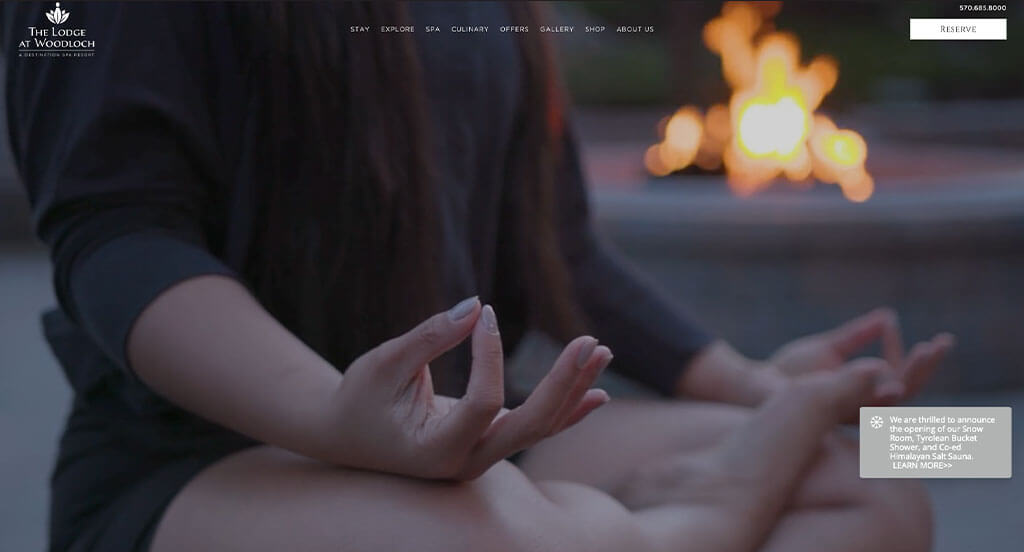
This is a great hotel web design example for anyone who is looking for a professional look and feel for their net custom site. The layout of this hotel website was thoughtful because of their creative logo design. The use of an automatically playing video was a unique choice for a custom hotel site. The Lodge at Woodloch clearly had digital marketing in mind when including social media into their website. If you are looking for template examples for your next hotel website, be sure to check this one out.
42. Sonder
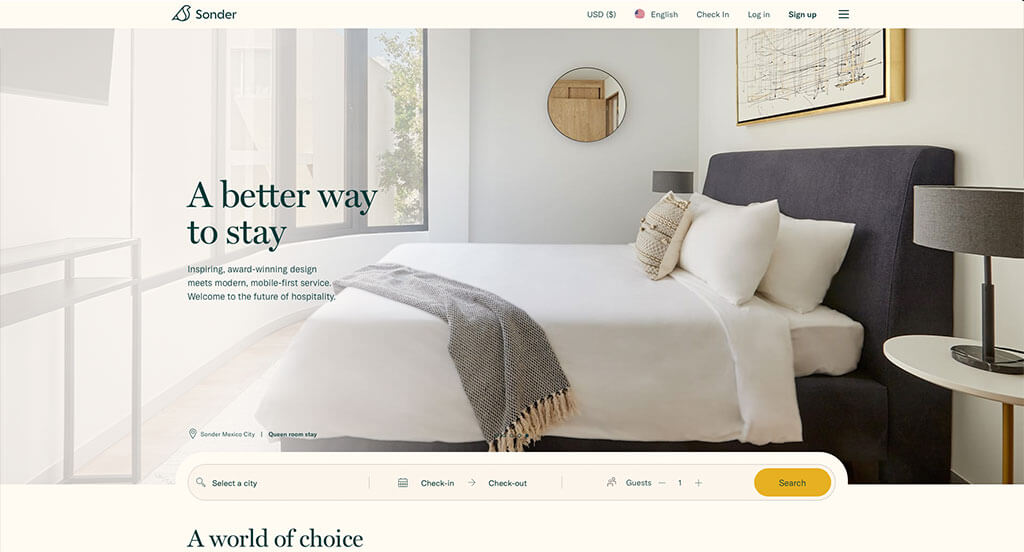
Our web designers noticed the white color scheme with accents of greens and yellows in the Sonder website, which we liked because it catches the eyes of viewers. After scrolling past the header of this hotel site, you’ll immediately notice their use of a search bar. Another feature in this clean hotel website we liked was their stunning imagery. Sonder had website marketing in mind when creating the customer review section for their website. So many attractive qualities to consider when ranking this website.
43. Camelback Resort

We liked how this hotel website combined the colors of white, blue and red into a custom web design. One of the homepage features of Camelback Resort we noticed was their use of icons because it was rather refreshing for a hotel website. Another feature in this custom hotel website was their images and titles to help enhance usability. Camelback Resort had website marketing in mind when creating the deals page for their website. What a great website to review when designing your next hotel website!
44. The Manhattan at Times Square
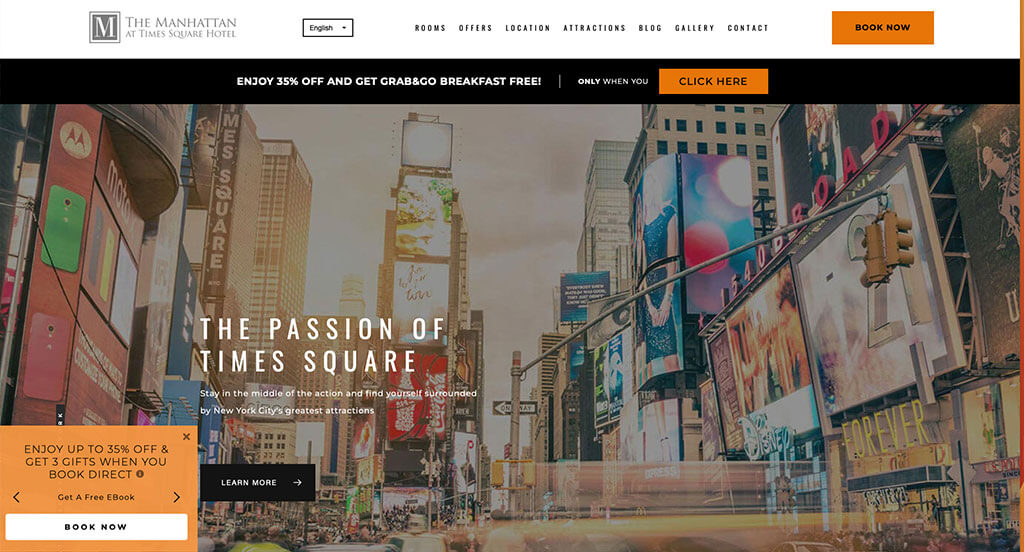
The black, white and small doses of red used in this custom hotel website stood out to us because it allows their images to be the focus of the pages. The large imagery was likely the most impactful feature in the homepage of The Manhattan at Times Square. The inclusion of a blog was definitely refreshing for a professional site. From a marketing viewpoint, we liked the way they utilized a template that was free of distractions. Be sure to consider the unique design of this hotel website when developing your next website.
45. The Pod Hotels
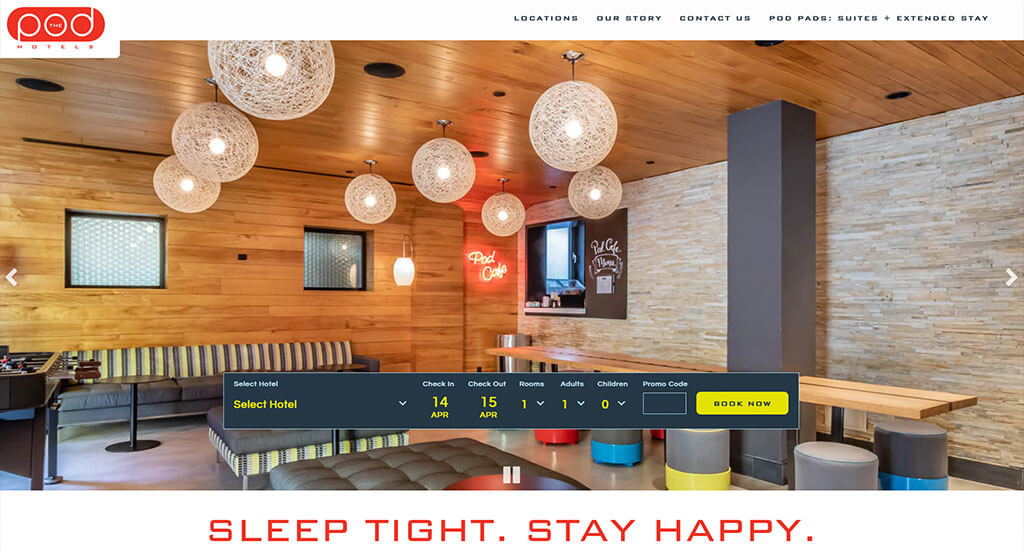
We chose The Pod Hotels because of its nicely organized hotel website that uses a a variety of colors for their color scheme. The creative graphics were definitely the most impactful quality in the homepage of The Pod Hotels. The subtle animations were a good choice for a unique site. They clearly had a focus on digital marketing when building the different fonts throughout their website. Don’t forget to check this website out while looking through our list of the best hotel website layouts!
46. Public Hotel
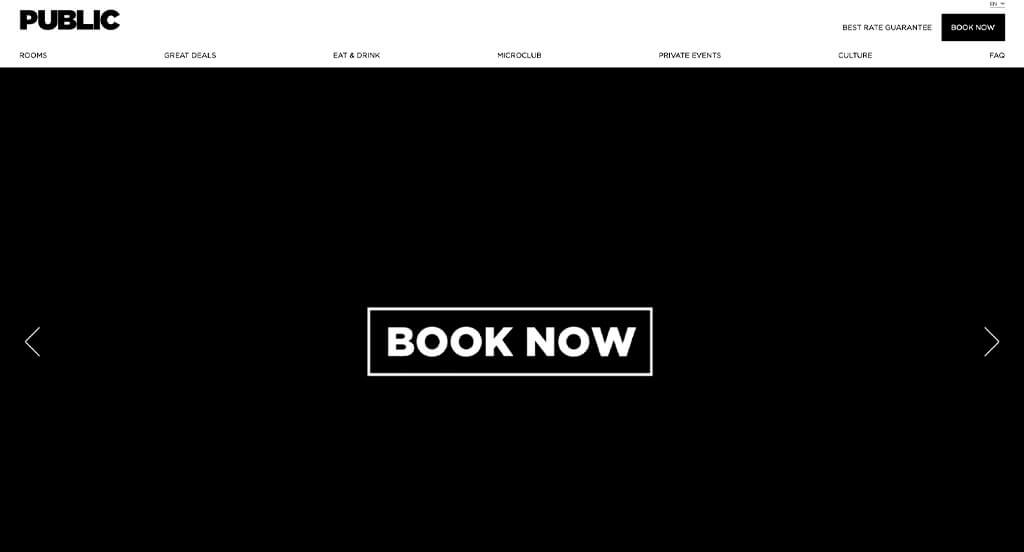
This is a great website design example for hotels who are looking for a custom website design. The most attention grabbing aspect of this hotel website was definitely their high quality visuals. This professional hotel website also does a good job with their FAQ page. Public Hotel had website marketing in mind when designing the neighborhood section for their website. For hotels looking for examples for their next website layout, this design example will absolutely be one to consider.
47. Yotel
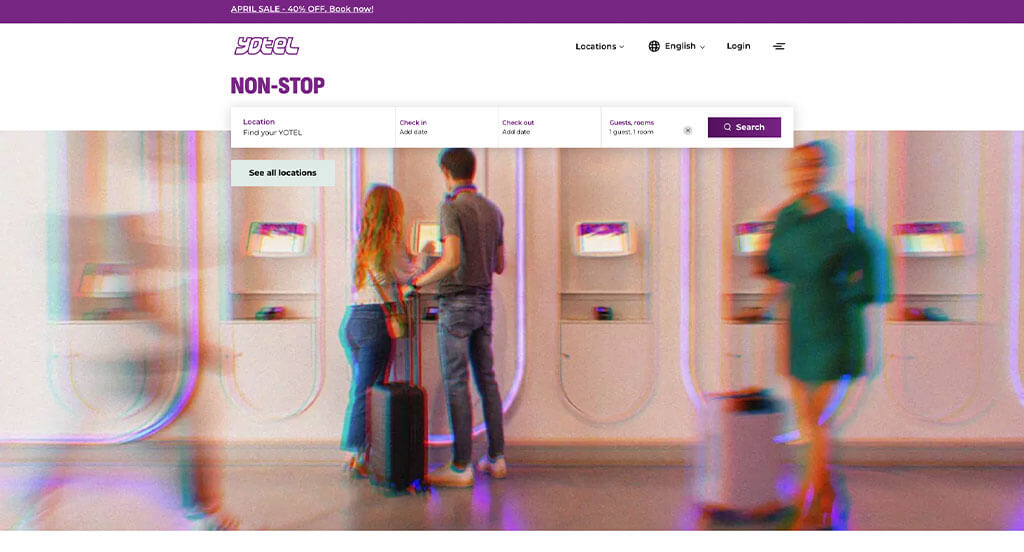
This is a good example of a hotel website design that can give inspiration to other companies for their next professional website. The relaxing color scheme was definitely the most impactful feature in the homepage of Yotel. Another thoughtful quality in this professional hotel site we enjoyed was the use of buttons to enhance usability. They clearly had a focus on website marketing when building the template that was easy to navigate. With so many quality reasons to consider this hotel website, it’s obvious why we included it in this list of the best sites!
48. Standard Hotels

For a hotel website, they did a great job utilizing the black, white and red colors throughout their site. After scrolling past the navigation of this hotel website, you’ll notice the imagery used as backgrounds. Another feature in this clean hotel website was their simple sign-up for their mailing list. They clearly had website accessibility in mind when building the domain for their website that matches their company name. Talk about a great website to have included in this list!
49. 1 Hotels

This is a great hotel web design example for someone looking for a professional layout. As you scroll through the homepage, one of the qualities you’ll notice right away is their stunning visuals. The well organized navigation bar was a nice touch for a unique hotel site. They had website marketing in mind when creating the social media section for their website. Give some thought to the creative design of this hotel website when developing your next custom website.
50. The Langham
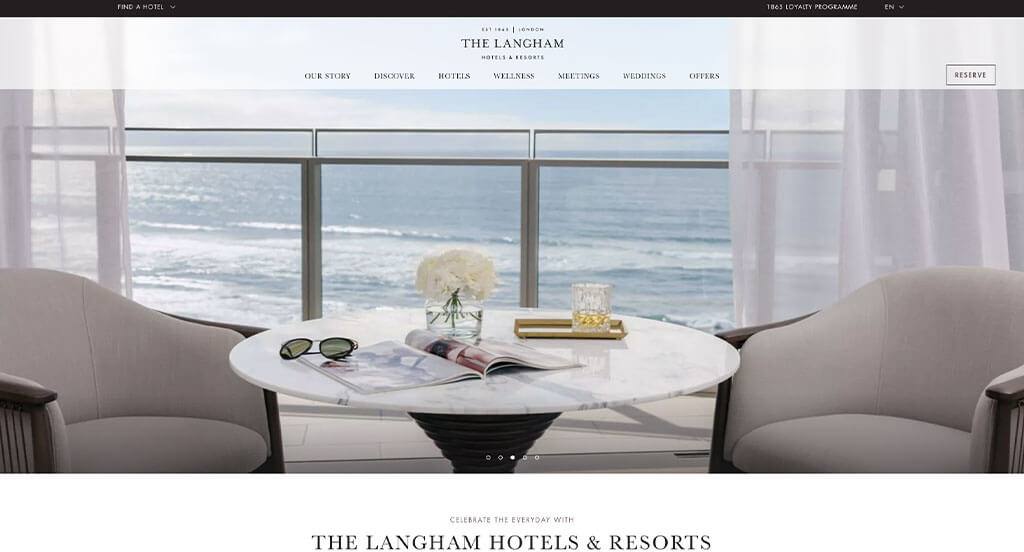
This is a good example of a hotel website design for someone looking for a professional layout. As you scroll through the homepage, one of the design qualities we liked was their sliding display to show off their locations. The inclusion of the company’s timeline was another design quality in this custom hotel website we enjoyed. Langham Hotels had conversions in mind when creating the display of their coming soon hotels. What a great website to review when designing your next hotel website!
51. The Pearl Hotel
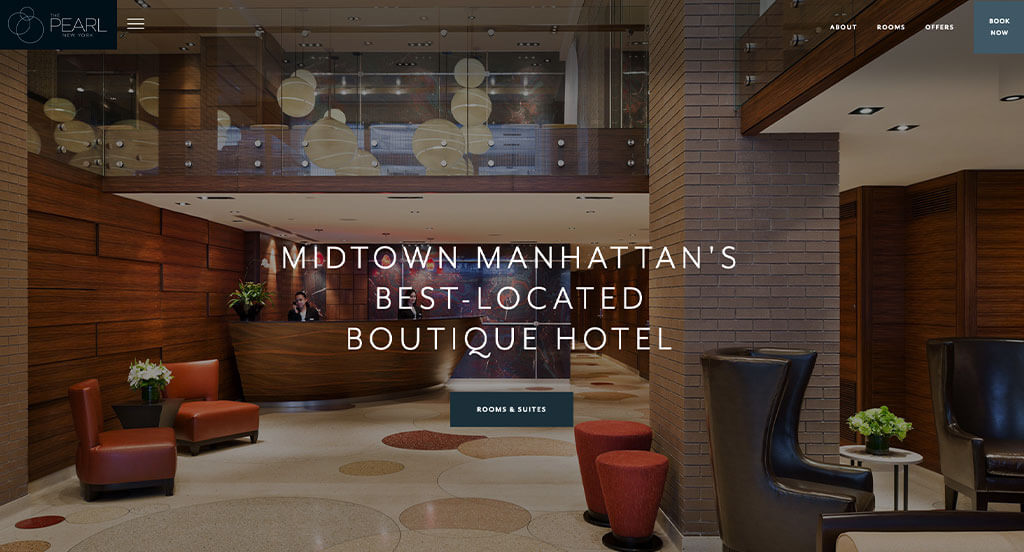
The black, white and grayish-blue colors used in this custom hotel site stood out to us because it creates a sleek and professional design. Of all the custom hotels websites we reviewed, one of the features in this custom website we liked was the simple but stunning logo design. The simple contact information was another thoughtful feature in this custom hotel website we enjoyed. The Pearl Hotel clearly had a focus on conversions when building the creative layout for their website. Any website designer mocking up websites for hotels will want to consider checking this website out.
52. The Ritz-Carlton
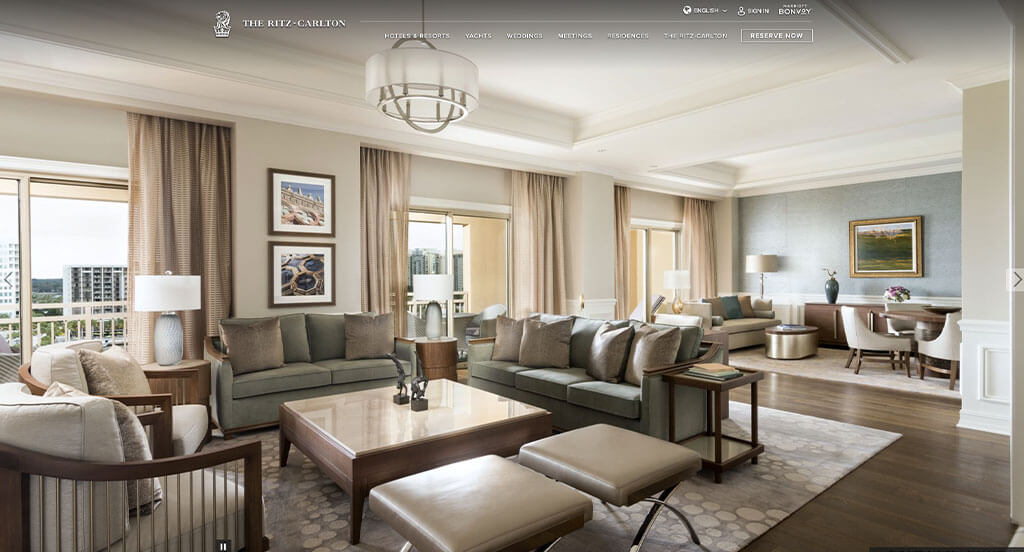
This is a great website design example for hotels who are looking for a custom look and feel for their next site. After scrolling past the navigation of this hotel site, you’ll notice the geometric patterned graphics for their background. The feeling of unity throughout the site was absolutely a consideration when ranking The Ritz-Carlton in this list of top hotel websites. The Ritz-Carlton clearly had a focus on internet marketing when creating the domain for their website that matches the company name. If you are looking for template examples for your next hotel site, give some thought to this one.
How to Build a Great Hotel Website
Are you in the process of building a new website for your hotel? How exciting!
Let’s walk through some of the most important steps in building a new, or redesigning an existing, hotel website.
Feel free to skip the first few sections if you already have a domain name, hosting service, and website platform picked out!
1.) Purchasing a Domain Name
Picking out a domain name for your hotel website is a crucial step in establishing your hotel’s online identity. It serves as the address that visitors will use to access your hotel website, and it plays a significant role in branding and recognition of your establishment.
Here’s a step-by-step process to help you choose the perfect domain name:
- Brainstorm: Start by thinking of ideas for your domain name, considering the name of your hotel, its location, and any unique features or offerings.
- Simplicity: Try to keep your domain name simple, easy to spell, and memorable. Avoid using complex words, hyphens, or numbers.
- Consistency: If your hotel has an established brand name, it’s generally a good idea to include it in your domain name. For example, if your hotel is called Copper Rock Hotel, don’t register a domain name such as CheapHotelRooms.online.
- Availability: Check the availability of your desired domain names before proceeding. Many common domain names have already been registered. If that is the case, see if your desired domain name is available for sale or consider alternative options.
- Domain Extensions: Consider which domain name extension best suits your website’s purpose. While .com is the most common and widely recognized extension, there are other options available, such as .hotel, .travel, or country-specific extensions like .us or .uk.
- Legal Considerations: Before registering your domain name, conduct a trademark search to ensure it doesn’t infringe upon someone else’s intellectual property. Avoid using brand names or trademarks owned by other hotels or hospitality businesses.
- Register the Domain: Once you’ve settled on an available domain name, register it through a reputable domain registrar. Popular domain registrars like GoDaddy, and Namecheap are user-friendly options for domain name registrations.
2.) Choosing a Website Platform
After figuring out your domain name, the next step is selecting a website platform for your next website.
You’ll often find smaller motels, bed and breakfast, cabins, and similar properties to build out content-based websites with contact forms and phone numbers to drive conversions.
For larger motels and hotels, you’ll often see online booking systems integrated into the website. This can be through internally built applications if you have the budget, or monthly services through companies like RezStream.
There are in-between solutions as well, where a smaller organization wants to offer reservations but tries to do it through a WordPress plugin to save on expense.
For Content Websites:
When it comes to content-based hotel websites, there are several options to consider, including WordPress, Wix, and other hosted website builders.
- WordPress: WordPress is a highly versatile and widely used content management system (CMS) that offers great flexibility and customization options. It caters to all types of hotel websites, allowing you to create a website that showcases your hotel’s unique features, amenities, and booking functionality. With a vast selection of hotel-themed themes and helpful plugins available, WordPress enables you to create a tailored and visually appealing website for your hotel. It provides you with control and the ability to expand your website’s functionality over time. While there is a hosted version of WordPress, most hotel websites utilize the open-source version installed on a web hosting account.
- Wix: The Wix platform offers comparable page-building features. Wix is another suitable option for building hotel websites, and its intuitive interface allows you to create a professional-looking site without technical expertise. Wix provides hosting services, eliminating the need for a separate web hosting provider.
It isn’t common to see hotels and motels running ecommerce websites in platforms like WooCommerce or Shopify.
Web Hosting Requirements
If you choose a platform like WordPress or WooCommerce, you’ll need to find a web hosting service.
As a suggestion, consider our own reliable web hosting service, which is highly compatible with WordPress websites. If you prefer recommendations from other hosting companies, consider the following:
- WP Engine: This is a preferred web hosting service for hotels. WP Engine offers a great control panel that simplifies the creation of staging websites. Their backup process is seamless, and they provide excellent service. However, it’s important to note that they have limits on PHP max_execution_time, and their pricing may increase for upgraded services.
- SiteGround: We recommend SiteGround for their reliable hosting services. Their live chat and email support are excellent compared to other well-known hosting firms. They respond quickly and effectively to resolve any issues. SiteGround’s backup tools are user-friendly, and their pricing is reasonable for hotels.
- Digital Ocean: This option is suitable for cloud hosting, although it may be too advanced for most hotel websites. Digital Ocean offers a reliable cloud network, unlike other cloud networks we’ve tried. However, cloud hosting can be costly when factoring in droplet (server instance) costs, operating system, control panel, server software, offsite backup, and server management fees. If you need server administration, we recommend AdminGeekZ.
3.) Selecting a Website Template
Many hotels prefer to use pre-designed website templates as they significantly reduce web development costs and time. However, if your hotel prefers a custom design, you can hire a custom web developer or custom ecommerce developer to create a theme specifically for your needs.
For the purpose of setting up a hotel website, let’s focus on suggestions for finding pre-built website templates. Here are some links to popular theme marketplaces:
WordPress Hotel Themes
You can find free themes at wordpress.org, or explore hotel-inspired templates on ThemeForest.
Zante – Themeforest
$64
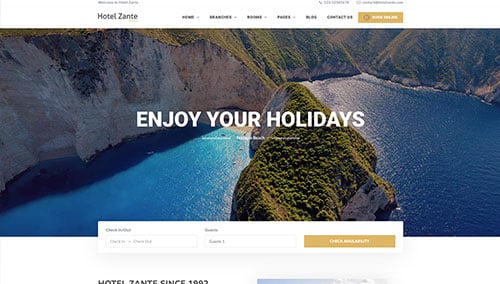
Himara – Themeforest
$59
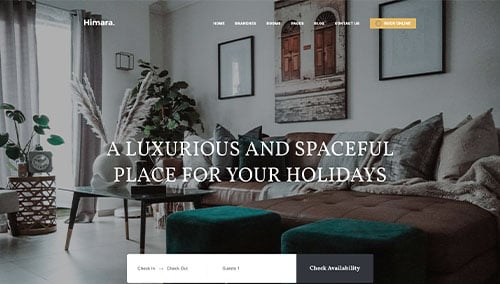
Hotello – Themeforest
$59
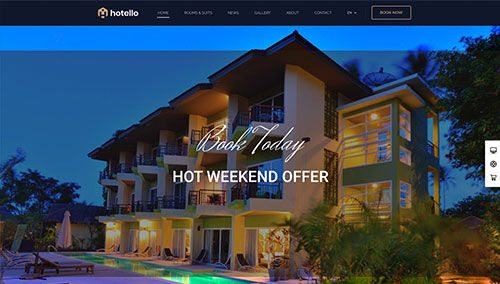
Hotale – Themeforest
$69
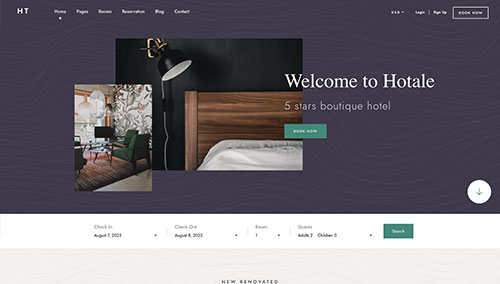
Wix Hotel Themes
Find free and paid themes in their marketplace at wix.com, including options suitable for hotels.
4.) Crafting Content & Adding Images
Now that you’ve secured your domain name, chosen a website platform, and selected a theme, it’s time to start creating content for your hotel website!
Here are some helpful tips to create engaging and effective website copy:
- Know your target audience: Before writing a single word, understand your target audience’s demographics, preferences, and needs. Tailor your content to address their interests, provide value, and resonate with them. This will help your hotel website rank well in relevant search engine results.
- Define your key messages: Determine the main messages you want to convey through your website content. Align them with your hotel’s brand, highlight your unique offerings, and clearly communicate the benefits of staying at your hotel.
- Keep it concise and scannable: Online readers tend to scan content, so make sure your writing is concise and easy to skim. Use short paragraphs, bullet points, subheadings, and bold text to enhance readability and break up the content.
- Create clear and compelling headlines: Craft attention-grabbing headlines that convey the value and relevance of your hotel. A well-crafted headline can entice visitors to explore your website further and learn more about what you offer.
- Incorporate keywords strategically: Research relevant keywords and incorporate them naturally throughout your content. This can improve your hotel website’s visibility in search engine rankings. Avoid keyword stuffing, as it can negatively impact readability and user experience. Tools like Ahrefs or Semrush can assist with keyword research.
- Maintain a conversational tone: Write in a conversational style that resonates with your hotel’s target audience. Avoid jargon or overly technical language unless it’s necessary for your specific audience. Engage your readers by addressing them directly and adopting a friendly, approachable tone.
- Edit and proofread: Always edit and proofread your content before publishing. Check for grammar, spelling, and punctuation errors. Ensure the flow of your content is smooth, logical, and consistent with your hotel’s brand voice and style guidelines. Tools like Grammarly can be helpful in the editing process.
- Utilize ChatGPT for assistance: If you need ideas or help refining the content on your hotel website, consider leveraging AI tools like ChatGPT.
Additionally, it’s important to enhance your content with relevant and high-quality images. Here are some tips:
- Choose high-quality images: Opt for visually appealing and well-composed high-resolution images. Blurry or pixelated images can diminish the overall quality of your hotel website.
- Ensure relevance: Select images that are relevant to your content and help convey your message. Use images that showcase the unique features and offerings of your hotel, enhancing the text and providing additional visual interest.
- Explore stock photo resources: Utilize reputable stock photo websites like Unsplash, Pixabay, or Shutterstock. These platforms offer a wide range of professional-quality images related to the hotel industry. Be mindful of licensing requirements and attribute images when necessary.
- Customize images when possible: If you have the resources or skills, consider customizing or branding images to align with your hotel’s visual identity. This helps create a cohesive and unique visual experience for your website visitors. Tools like Adobe Photoshop or Canva can assist in image customization.
- Optimize image file sizes: Compress images to optimize their file sizes without compromising quality. Large image files can slow down your hotel website’s loading speed, negatively impacting user experience and SEO. Tools like TinyPNG can help with image compression.
5.) Post Launch Strategies
Once your hotel website is built and launched, there are several important tasks and services to consider in order to maximize its effectiveness. Here are some essential suggestions to help you navigate post-launch activities:
- Search Engine Optimization (SEO): Implementing effective SEO techniques is crucial for improving your hotel’s visibility in local search results. Conduct keyword research, optimize your content, and ensure your website has a solid internal linking structure. Regularly update your website with fresh, high-quality content to attract organic traffic. Consider our SEO services or explore reputable providers like The HOTH for assistance.
- Paid Advertising: For quick traffic results, consider utilizing paid advertising platforms such as Google Ads or Facebook Ads to drive targeted visitors to your hotel. You can hire our PPC management services or find talented professionals on platforms like Mayple.
- Conversion Rate Optimization (CRO): Analyze your hotel website’s performance and user behavior using tools like Google Analytics. Identify areas where users may drop off or encounter barriers to conversion. Conduct A/B testing using tools like VWO to make data-driven changes that improve your hotel website’s conversion rates and overall user experience.
- Website Security: Protecting your hotel website from malware and other security threats is essential. Ensure you have robust security measures in place, such as SSL certificates, web application firewalls (like Sucuri), and regular backups. Keep your CMS, plugins, and themes up to date to minimize vulnerabilities. Monitor your website for any potential security risks and respond promptly to any issues. It’s also recommended to monitor website uptime using a service like UptimeRobot.
- Website Maintenance: Regularly maintain your hotel website to ensure optimal performance. If you’re using WordPress, this includes updating plugins and themes, monitoring website speed and performance, and resolving any broken links or errors. Consider our website maintenance services or hire a freelancer from platforms like Upwork. Don’t forget to regularly back up your hotel website to protect against data loss or technical issues.
- User Feedback and Testing: Actively seek user feedback to understand visitor experiences and identify areas for improvement. Implement user testing to gather insights on how users interact with your hotel website. Use this feedback to make iterative enhancements and continuously optimize the user experience.
- Content Updates: Keep your website content fresh and up to date. Regularly publish new blog posts related to hotels, update information about your services and facilities, and ensure that all information is accurate and relevant. Engaging and valuable content not only attracts visitors but also encourages them to return and share your hotel’s offerings with others interested in hospitality.
Remember, post-launch digital marketing activities are crucial for the long-term success of your hotel website. Stay proactive, monitor performance, and adapt your strategies to achieve your business goals and meet the needs of your audience.